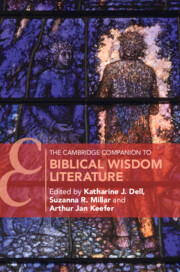Book contents
- The Cambridge Companion to Biblical Wisdom Literature
- Cambridge Companions to Religion
- The Cambridge Companion to Biblical Wisdom Literature
- Copyright page
- Contents
- Contributors
- Acknowledgement
- Abbreviations
- Part I The Context of Wisdom Literature
- Part II Wisdom Literature in the Hebrew Bible
- Part III Wisdom Literature beyond the Hebrew Bible
- Part IV Themes in the Wisdom Literature
- 20 Creation in the Wisdom Literature
- 21 Reward and Retribution
- 22 From Rebuke to Testimony to Proverb
- 23 The Wisdom Literature and Virtue Ethics
- Bibliography
- Index
- Cambridge Companions to Religion
- References
21 - Reward and Retribution
from Part IV - Themes in the Wisdom Literature
Published online by Cambridge University Press: 28 July 2022
- The Cambridge Companion to Biblical Wisdom Literature
- Cambridge Companions to Religion
- The Cambridge Companion to Biblical Wisdom Literature
- Copyright page
- Contents
- Contributors
- Acknowledgement
- Abbreviations
- Part I The Context of Wisdom Literature
- Part II Wisdom Literature in the Hebrew Bible
- Part III Wisdom Literature beyond the Hebrew Bible
- Part IV Themes in the Wisdom Literature
- 20 Creation in the Wisdom Literature
- 21 Reward and Retribution
- 22 From Rebuke to Testimony to Proverb
- 23 The Wisdom Literature and Virtue Ethics
- Bibliography
- Index
- Cambridge Companions to Religion
- References
Summary
The contribution by Peter T. H. Hatton is dedicated entirely to conceptions of reward and retribution in the wisdom literature. He considers how well-placed and sometimes misplaced the paradigm can be, namely that wickedness brings retribution and righteousness brings reward. Such doctrines, he says, remain ‘key claims of a dominant interpretive tradition’ and have consequently formed a ‘pejorative paradigm’ that leaves the book of Proverbs out of favour in comparison to more nuanced books of the OT. The seminal work of 1955 by Klaus Koch – ‘Gibt es ein Vergeltungsdogma im Alten Tesament?’ (Is there a Dogma of Retribution in the Old Testament?) – receives special attention, as do subsequent, critical responses to it. Hatton suggests that the moral mechanism of act-consequence is just not that predictable and that in Proverbs, Job and Ecclesiastes the paradigm is principally relational. For ‘reward’ and ‘retribution’ are not mechanical but are rather conditioned by one’s relationship with the Lord.
- Type
- Chapter
- Information
- The Cambridge Companion to Biblical Wisdom Literature , pp. 414 - 432Publisher: Cambridge University PressPrint publication year: 2022

